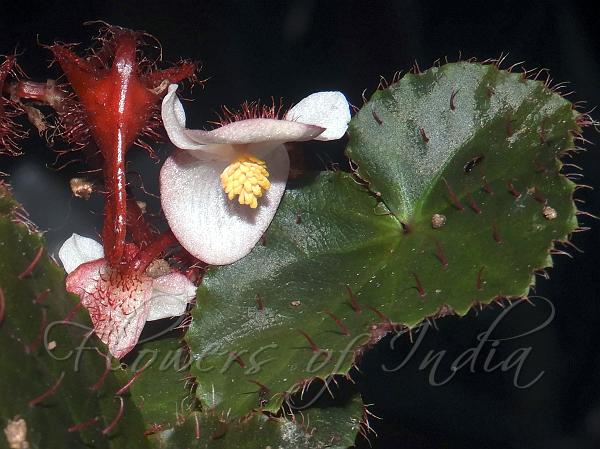|
| Limpricht Begonia |
|

|

| File size | 831097 |
| Original date | 6/28/21 11:47 AM |
| Resolution | 5184 x 3888 |
| Flash | Flash fired, auto |
| Focal length | 12.5mm |
| Exposure time | 1/30s |
| Aperture | 5.0 |
| Focus Distance | |
| Metering Mode | Multi-segment |
| Camera make | NIKON |
| Camera model | COOLPIX B700 |
| Sensor type |
|
|
|
|
Photo: |
Botanical name: Begonia limprichtii Family: Begoniaceae (Begonia family)
Synonyms: Begonia houttuynioides
Synonyms: Begonia houttuynioides
Limpricht Begonia is a herb named after the botanist
Dr W. Limpricht. Leaves are basal, leaf-stalk 3-8 cm, densely brown
hairy, leaf-blade ovate or broadly ovate, asymmetric, 5-8 x 4-7 cm,
below hairy, above red bristly, venation palmate, 7-veined, base
shallowly heart-shaped, margin remotely and irregularly finely toothed,
very shallowly divided, tip shortly tapering. Flowers are borne in
clusters 8-16 cm tall, nearly hairless or hairless;
flower-cluster-stalk 1-1.3 cm; bracts ovate-lanceshaped, 6-10 x 2-4 mm,
margin fringed with hairs, tip tapering and shortly cuspidate. Male
flowers: flower-stalk about 4 mm; tepals 4, white or rarely pink, outer
2 broadly ovate, 1.8-2 x about 1.5 cm, below hairy, inner 2 broadly
elliptic, about 10 x 5 mm. Female flowers: flower-stalk about 2.2 cm;
tepals 4 or 5, unequal, largest nearly round, broadly oblong, or
broadly ovate, 1.5-1.6 cm, smallest oval or oblong, 10 x 5 mm; styles
2, fused to halfway; stigmas 2-cleft, spiraled. Capsules are nodding,
obovoid-oblong, 10-13 x 7-9 mm, unequally 3-winged; lower wing
strap-shaped, 13-17 x 5-9 mm; lateral wings 3-5 mm. Limpricht Begonia
has been previously known from Sichuan and Yunnan in China. However now
it is known to occur in Arunachal Pradesh too. Flowering: May-June.
| Identification credit: Momang Taram | Photographed at Geku, Upper Siang, Arunachal Pradesh. |
• Is this flower misidentified? If yes,